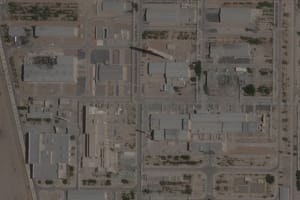IAEA head Grossi warns Iran's time for nuclear talks running out

The head of the International Atomic Energy Agency (IAEA) Rafael Grossi warned the Iranian regime on Monday that Tehran is running out of time for securing an agreement concerning international oversight of Iranian nuclear sites.
“There is still time, but not much. Always enough when there is good faith and a clear sense of responsibility,” Grossi announced in Vienna at the quarterly meeting of the IAEA’s 35-nation Board of Governors.
Despite the warning, he expressed cautious optimism that an agreement could be reached with the ayatollah regime in the near future.
“Progress has been made. It is my sincere hope that within the next few days it will be possible to come to a successful conclusion of these discussions in order to facilitate the resumption, the full resumption, of our indispensable work with Iran,” the IAEA head argued.
Tehran has blocked access to its key nuclear sites for international inspections after Israel and the U.S. bombed the sites during the Operation Rising Lion offensive in June. Iran responded by passing a law where Tehran suspended its cooperation with the IAEA.
The ayatollah regime officially denies that it seeks nuclear weapons and claims that its nuclear program is only meant for peaceful civilian usage. However, Tehran has insisted on enriching uranium to 60%, which is close to military level and has no civilian applications. Furthermore, Iran’s key nuclear sites have been heavily fortified and are partly underground.
Last month, Germany, France and the United Kingdom, collectively known as the E3 powers, announced that they intend to reinstate sanctions on Iran after the nuclear talks with Tehran collapsed.
"The E3 are committed to using every diplomatic tool available to ensure Iran never develops a nuclear weapon. That includes our decision to trigger the 'snapback' mechanism today through this notification," Germany, France and the United Kingdom wrote in a joint letter.
"The E3's commitment to a diplomatic solution nonetheless remains steadfast. The E3 will fully make use of the 30-day period following the notification in order to resolve the issue giving rise to the notification," the letter added.
Since the sanction mechanism is implemented after 30 days, it means that the sanctions will be imposed by the end of September unless a new nuclear agreement is reached before this deadline.
The threat of new sanctions has prompted the Iranian regime to renew talks with the IAEA.
“I am confident that with these practical steps (on inspections) in place, other important diplomatic consultations and processes will find a more promising ground upon which to advance towards positive outcomes,” Grossi stated.
While Grossi called for negotiations conducted in “good faith,” the Iranian regime has a history of systematic double dealing and stalling negotiations in order to gain more time to advance its covert nuclear weapons program.
Meanwhile, the foreign ministry in Tehran stated that the talks with the IAEA were “positive” but admitted that they had not yet matured into a mutually acceptable agreement. Tehran also refrained to specify the time frame for the new round of talks with the UN nuclear watchdog.
“On Saturday, the third round of negotiations ended and their results are currently being reviewed in Tehran by relevant authorities and we will announce the next steps when this review is finalized,” Iranian foreign ministry spokesperson Esmaeil Baghaei told media representatives on Monday.

The All Israel News Staff is a team of journalists in Israel.
You might also like to read this:

















